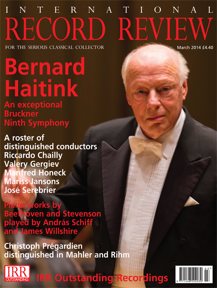Texte paru dans: / Appeared in:
*

International Record Review - (03//2014)
Pour
s'abonner / Subscription information
Decca
4785336

0028947853367 (ID326)
As one can see from the heading, this Decca CD contains seven sacred works by Agostino Steffani (1654-1728), ranging in duration from 25’08” for his Stabat mater to 2’51” for Triduanas a Domino. All except that longest composition are listed as receiving a world- premiere recording, and the Stabat mater fails far short of the settings by Pergolesi and by Rossini when it comes to the number of times that it has been committed to disc.
The back of the inlay in the case tells us that ‘Cecilia Bartoli continues her Mission to discover the music of Agostino Steffani’, for which she deserves to be congratulated, for I have found this to be a gorgeous disc: lovely music, delightfully sung, splendidly played and very well recorded.
The six shortish works were written in the early years of Steffani’s compositional career, in the 1670s, of which the first were Triduanas and Laudate pueri, both dating from 1673. In contrast, the essay by Clive Timms in the booklet informs us that Steffani referred to his Stabat mater as his final composition and his masterpiece. Indeed, this Stabat mater is filled with beautiful melodies, of which a winning section is ‘Eja mater’, which in its 4’15”contains four subsections, as it were, in which one hears four of the five soloists and the chorus. Much of that falls to Bartoli and the countertenor, or sopranist, Franco Fagioli, who complement each other in concordant tones, as they do in their brief duet ‘Non pavescat lethales horrores’ in Qui diligit Mariam, a work of ten minutes’ duration that chiefly involves the chorus but with one aria, ‘Tempus est de somno surgere’, for the bass in addition to the duet.
Fagioli has some solo work in Laudate pueri, which is placed fifth on the disc, and is as smooth and easeful in his singing there as in Stabat mater. Bartoli, however, is the only singer to have a piece to herself : Non pius me ligate, which apparently is the one sacred setting for soprano that Steffani wrote. It runs for 6’22”, over which she sings with flair and floridity, as one might expect. I know that opinions vary over some aspects of Bartoli’s vocalism, especially in quick music, but her admirers should delight in this piece, alone among the seven works in having no chorus.
The Coro della Radiotelevisione Svizzera more than makes up for that with the two selections that leave out soloists, namely the antiphon Triduanas a Domino and the vesper psalm Beatus vir. This well-balanced group proves to be a very satisfying component in the pleasure afforded by what one hears, with welcome clarity. Named in the choir are a few singers who have performed solo works on record, such as Rossana Bertini, Sylva Pozzer and Marco Scavazza. The chorus master is Diego Fasolis, who is also the conductor of the euphonious I Barocchisti, compounding one’s enjoyment. The list of players’ names lets us know that the orchestra includes three trombonists and a cornettist along with their colleagues playing stringed and keyboard instruments.
Two tenors are involved in Stabat mater and Laudate pueri, both men being the Sons of professional singers: Daniel Behle, son of soprano Renate, and Julian Prégardien, whose father is the oft-recorded Christoph. The clear tones of the young men blend well, and in solo work (more of it for Behle than Prégardien) their fresh lyric voices are in accord with their music. Also forming an attractive pairing are the sopranos Nuria Rial and Yetzabel Arias Fernandez, who seem inseparable in Laudate pueri and Sperate in Deo, in which Steffani wrote parts which contain elaborate interplay, to which they respond by soaring in sure flights. There remains from the individual singers the bass Salvo Vitale, whose very dark voice is tested by some low lines in ‘Vidit suum dulcem Natum’ in Stabat mater, and although he is caught in what I shall cal ‘growldom’ at one point he manages well the bursts of coloratura and does not let the side down.
One can obtain these performances on a CD available
separately or in a three-disc box in which one is devoted to dances and
overtures by Steffani from such operas as Marco Aurelio, Niobe, regina di
Tebe and Henrico Leone ... The last-named was
issued complete some years ago by Calig with Ralf Popken as Henrico
(CAL50855). The third disc contains 25 tracks of Steffani’s operatic arias
sung by Bartoli with the same orchestra under Fasolis. In my copy of this
the book-covers are upside down.
Fermer la fenêtre/Close window
Cliquez l'un ou l'autre
bouton pour découvrir bien d'autres critiques de CD
Click either button for many other reviews


